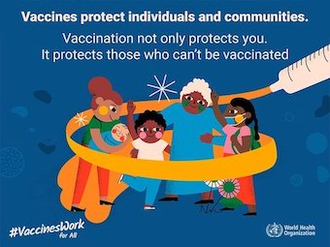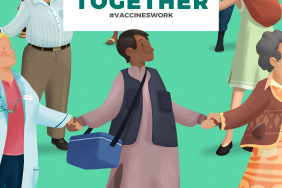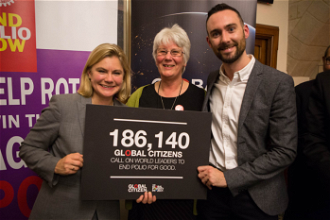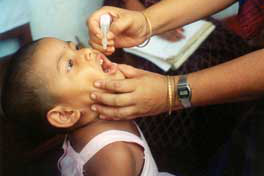World Immunisation Week 2024 - A determination to defeat illness

Sister Gillian Price FC writes:
On April 11th Pope Francis addressed the participants in the plenary assembly of the Pontifical biblical commission as they met to discuss, 'Sickness and suffering in the Bible.'
Rather than avoiding the topic of suffering like a taboo, he said, we should endure trials "by living in relation with others" and allow God to turn "the sieve of suffering" into an opportunity to mature and grow in faith. We know that pain and infirmity, in the light of faith, can become decisive factors in a process of maturation: the "crucible of suffering" allows us to discern what is essential and what is not'.
When I read this, I thought of Paul Alexander who died in March 2024, age 78. In 1952, age six, Paul Alexander contracted polio in 1952. Polio paralysed him for life so that he was only able to move his head, neck and mouth and made him dependent on an iron lung for the next 72 years, longer than anyone else in history. Through determination Alexander gained a degree in law and was able to practice law. He said: "My story is an example of why your past or even your disability does not have to define your future," Alexander added. "No matter where you're from or what your past is, or the challenges you could be facing. You can truly do anything. You just have to set your mind to it and work hard."
Ending polio globally was also Paul's ambition. He wrote about it in his 2020 memoir, which he typed himself, using a pencil attached to a stick gripped in his mouth to reach the computer keyboard. Paul said that he likes talking about polio and the iron lung, and about his life, because what terrifies him, is that the world will forget what polio was like. David Oshinsky, the author of Polio: An American Story, believes that the success of vaccines in eradicating so many deadly diseases is precisely why the anti-vaccination movement has gained ground in recent years. "These vaccines have done away with the evidence of how frightening these diseases were," he said. This debilitating and life-threatening disease of childhood has been eradicated from 99% of the planet in recent decades. It is now only endemic in two countries, Pakistan and Afghanistan. The look of distress on a Pakistani father's face as he held his six-year-old boy paralysed by polio earlier this year is a sad echo of what Paul Alexander's father must have felt 72 years ago.
There is no cure, but polio is preventable with a vaccine, a vaccine that was invented in 1955, largely wiping out the virus and protecting people against it. Since the Global Polio Eradication Initiative (GPEI) was established in 1988, more than 2.5 billion children have been immunised against polio, thanks to the cooperation of more than 200 countries and 20 million volunteers. Over the past ten years, over 10 billion doses of oral polio vaccine have been given worldwide. Without this vaccine, more than 6.5 million children would have been paralysed over the same period.
Today the world has a historic chance to end polio for good, but if we don't stay committed, the virus could quickly make a comeback and paralyse thousands of children again every year. (In May 2022, six positive samples were reported following the isolation of vaccine-derived poliovirus from environmental samples in London.) This is a timely reminder that until we end polio forever, every child is at risk.
Aidan O'Leary, the Director for Polio Eradication at the World Health Organisation (WHO) has likened the efforts to eradicate polio to a marathon run of 26.2 miles. The UK government has been there every step of the way and it would be tragic if it were to pull out now at the end of the race. The UK has long been an active supporter of polio eradication, and promised £400 million to the Global Polio eradication initiative (GPEI) in 2019 for the period 2020-23. However, cuts to the UK's Official Development Assistance (ODA) in 2021 reduced polio funding by 95%. While some additional funding has since been released, more resources are now needed to help fund the efforts needed to re-energise polio eradication programmes. GPEI is therefore asking £100 million from the UK for the period 2025-26 as its fair share of the global investment that is now needed.
Speaking of suffering, Pope Francis said, "Jesus exhorts us to take care of those living in situations of infirmity, with the determination to defeat illness."
Today, governments and health workers, with support from the global polio programme, have the tools and strategies needed to overcome the final hurdles to eradication and deliver broader health benefits to communities along the way. The world must keep up the momentum, resources, and determination needed to ensure that no child, no matter where they live, is paralysed by polio again. A polio-free world is only possible if donors, polio-affected country governments, and global advocates rally together and renew financial and political commitments to the Global Polio Eradication Initiative (GPEI). Clearly the political will is needed and a sustained determination to defeat the illness.
This World Immunisation Week (24-30 April) is a good moment to ask the UK Government to invest £100 million in GPEI for the period 2025-26 to demonstrate its determination to defeat polio for good.
LINK
Key messages for World Immunisation Week: https://results.org.uk/world-immunisation-week-2024-key-messages/


















